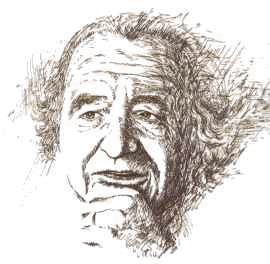Or: "I detest the kind of poetry which is nothing but an intellectual pastime for the middle-of-the-roaders, who wash their hands and splits hairs to evade the issues. I detest poetry written by those do not take sides, do not commit themselves for the fear the dirt might stick."

Around 1956, Celaya began to dedicate himself full-time to writing, leaving behind a career as an engineer. He went on to become a strong critic of the Franco regime. His career as a poet was rewarded in 1986 with the National Spanish Literature Prize. In 1991, he passed away in Madrid. But we rarely see him discussed in the US.
I first ran into his quote as the opening to You Better Believe It: Black Verse in English a 1973 anthology edited by Paul Breman.
As a poet, I would concur with Celaya's condemnation of gutless poetry. Although Ezra Pound notably writes "poetry is news that stays news," Celaya is also correct that poetry should take a stance. It should have a position and not be afraid to present something another will question and should question. I've done this the most overtly in poems such as "five fragments," "Anthology," "Oni," "Hunting the Asian American Male," and "Khop Jai For Nothing, Farangs." Saymoukda Vongsay and Catzie Vilayphonh do this frequently in their work as Lao American poets and spoken word artists, as does Guante.
As Bei Dao and the Misty Poets demonstrate, sometimes, by necessity, our opinions will be veiled, but that does not mean the position has not been taken. The poem should have a position, but it should never be artless in presenting that position. It must still abide by the variform rules of poetry. And we should always remember, at the end of the day it is souls talking to souls.
If we cannot say something meaningful within a few words, why should we be given many to speak? I feel a good poet trusts their audience can discover an opinion and form one of their own, even one in disagreement with the poet.
But what do you think?
No comments:
Post a Comment